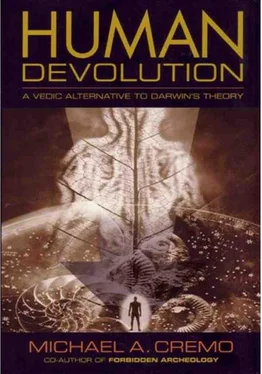Michael Cremo - Human Devolution - A Vedic Alternative To Darwin's Theory
Здесь есть возможность читать онлайн «Michael Cremo - Human Devolution - A Vedic Alternative To Darwin's Theory» весь текст электронной книги совершенно бесплатно (целиком полную версию без сокращений). В некоторых случаях можно слушать аудио, скачать через торрент в формате fb2 и присутствует краткое содержание. Год выпуска: 2003, ISBN: 2003, Издательство: Torchlight Publishing, Жанр: Старинная литература, на английском языке. Описание произведения, (предисловие) а так же отзывы посетителей доступны на портале библиотеки ЛибКат.
- Название:Human Devolution: A Vedic Alternative To Darwin's Theory
- Автор:
- Издательство:Torchlight Publishing
- Жанр:
- Год:2003
- ISBN:9780892133345
- Рейтинг книги:4 / 5. Голосов: 1
-
Избранное:Добавить в избранное
- Отзывы:
-
Ваша оценка:
- 80
- 1
- 2
- 3
- 4
- 5
Human Devolution: A Vedic Alternative To Darwin's Theory: краткое содержание, описание и аннотация
Предлагаем к чтению аннотацию, описание, краткое содержание или предисловие (зависит от того, что написал сам автор книги «Human Devolution: A Vedic Alternative To Darwin's Theory»). Если вы не нашли необходимую информацию о книге — напишите в комментариях, мы постараемся отыскать её.
Human Devolution: A Vedic Alternative To Darwin's Theory — читать онлайн бесплатно полную книгу (весь текст) целиком
Ниже представлен текст книги, разбитый по страницам. Система сохранения места последней прочитанной страницы, позволяет с удобством читать онлайн бесплатно книгу «Human Devolution: A Vedic Alternative To Darwin's Theory», без необходимости каждый раз заново искать на чём Вы остановились. Поставьте закладку, и сможете в любой момент перейти на страницу, на которой закончили чтение.
Интервал:
Закладка:
349–350).
Early experiences with mesmerism
Wallace first became interested in paranormal phenomena in 1843. Some English surgeons, including Dr. Elliotson, were then using mesmerism, an early form of hypnotism, to perform painless operations on patients. The reality of this anesthesia, although today accepted, was then a matter of extreme controversy. Wallace noted: “The greatest surgical and physiological authorities of the day declared that the patients were either impostors or persons naturally insensible to pain; the operating surgeons were accused of bribing their patients; and Dr. Elliotson was described as ‘polluting the temple of science.’ The Medical-Chirurgical Society opposed the reading of a paper describing an amputation during the magnetic trance, while Dr. Elliotson himself was ejected from his professorship at the University of London” (Wallace 1896, pp. ix–x ).
At the time, Wallace was teaching school in one of the Midland counties of England. In 1844, Mr. Spencer Hall, a touring mesmerist, stopped there and gave a public demonstration. Wallace and some of his students, greatly interested, attended. Having heard from Hall that almost anyone could induce the mesmeric trance, Wallace later decided to make his own experiments. Using some of his students as subjects, he soon succeeded in mesmerizing them and produced a variety of phenomena. Some were within the range of modern medical applications of hypnotism, while some extended to the paranormal (Wallace 1896, p. x , pp. 126–128; 1905 v. 1, pp. 232–236).
One thing witnessed by Wallace was community of sensation. “The sympathy of sensation between my patient and myself was to me the most mysterious phenomenon I had ever witnessed,” he later wrote. “I found that when I laid hold of his hand he felt, tasted, or smelt exactly the same as I did. . . . I formed a chain of several persons, at one end of which was the patient, at the other myself. And when, in perfect silence, I was pinched or pricked, he would immediately put his hand to the corresponding part of his own body, and complain of being pinched or pricked too. If I put a lump of sugar or salt in my mouth, he immediately went through the action of sucking, and soon showed by gestures and words of the most expressive nature what it was I was tasting” (Wallace 1896, pp.
127–128). During such experiments, Wallace took care to “guard against deception” (Wallace 1896, p. 126). From reports of the mesmeric experiments of other researchers, Wallace concluded that “the more remarkable phenomena, including clairvoyance both as to facts known and those unknown to the mesmeriser, have been established as absolute realities” (Wallace 1896, p. xi ).
Despite the well-documented observations of numerous competent researchers, the scientific establishment remained hostile to mesmeric phenomena. Eventually, the production of insensibility, behavior modification, and mild delusions would be accepted under the name of hypnotism. But the more extraordinary mesmeric manifestations—such as clairvoyance and community of sensation—were never accepted. In any case, Wallace found his own experiments of lasting value: “I thus learned my first great lesson in the inquiry into these obscure fields of knowledge, never to accept the disbelief of great men, or their accusations of imposture or of imbecility, as of any great weight when opposed to the repeated observation of facts by other men admittedly sane and honest” (Wallace 1896, p. x ).
Travels in the tropics
From 1848 to 1862, Wallace traveled widely in the tropics, collecting wildlife specimens and filling notebooks with biological observations. While on an expedition in the Amazon region of Brazil, he saw his brother Herbert mesmerize a young Indian man in a hut. At Herbert’s command, the young man’s arm became rigid. Herbert restored movement to the young man’s arm and then asked him to remain lying down in the hut until the brothers returned from a collecting excursion. When two hours later they came back, they found the young man still lying down, as if paralyzed, unable to rise although he had attempted it (Wallace 1905, v. 2, pp. 275–276).
When Wallace returned to England from Brazil, he did so alone, Herbert having died of a tropical disease. After a short time, Wallace set off on another expedition, this time to the East Indies. While in that region, Wallace learned of paranormal phenomena that went far beyond anything he had witnessed in his experiments with mesmerism. “During my eight years’ travels in the East,” he later recalled, “I heard occasionally, through the newspapers, of the strange doings of the spiritualists in America and England, some of which seemed to me too wild and outrageous to be anything but the ravings of madmen. Others, however, appeared to be so well authenticated that I could not at all understand them, but concluded, as most people do at first that such things must be either imposture or delusion” (Wallace 1905, v. 2, p. 276).
Despite his feelings of disbelief, Wallace suspended judgement. His experience with mesmerism had taught him that “there were mysteries connected with the human mind which modern science ignored because it could not explain” (Wallace 1896, p. 131). So when Wallace came back to England in 1862, he determined to look carefully into spiritualism.
First Spiritualistic experiences
Initially, Wallace contented himself with studying reports. But in the summer of 1865, he began to directly witness spiritualistic phenomena. His first experiences took place at the home of a friend, described by Wallace as “a sceptic, a man of science, and a lawyer” (Wallace 1896, p. 132). Wallace, along with his host and members of his host’s family, sat around a large, round table, upon which they placed their hands. Wallace observed inexplicable movements of the table and heard equally inexplicable sounds of rapping (Wallace 1896, pp. 132–133).
On a friend’s recommendation, Wallace then visited Mrs. Marshall, a medium who gave public demonstrations of phenomena stronger than those Wallace had yet seen. Wallace paid several visits to Mrs. Marshall in London, usually in the company of a skeptical friend with a scientific background. Among the numerous physical phenomena he witnessed were levitation of a small table one foot off the ground for a period of twenty seconds, strange movements of a guitar, inexplicable sliding movements of chairs across the floor, and levitation of a chair with a woman sitting upon it. Wallace noted: “There was no room for any possible trick or deception. In each case, before we began, we turned up the tables and chairs, and saw that there was no connection between them and the floor, and we placed them where we pleased before we sat down. Several of the phenomena occurred entirely under our own hands, and quite disconnected from the ‘medium’” (Wallace 1896, p. 136). At Mrs. Marshall’s, Wallace also saw writing mysteriously appear on pieces of paper placed under the table and heard the spelling out by raps of intelligible messages. These messages contained names and other facts of a personal nature, not likely to have been known by the medium (Wallace 1896, pp. 137–138). Wallace himself received a message that contained his dead brother’s name, the place where he died in Brazil, and the name of the last person to see him alive (Wallace 1896, p. 137).
As a result of such experiences, Wallace eventually became a convinced spiritualist. Critics suggested that Wallace was predisposed to spiritualism because of religious leanings (Wallace 1896, p. vi). But Wallace, describing his view of life at the time he encountered spiritualism, wrote: “I ought to state that for twenty-five years I had been an utter sceptic as to the existence of any preter-human or super-human intelligences, and that I never for a moment contemplated the possibility that the marvels related by Spiritualists could be literally true. If I have now changed my opinion, it is simply by the force of evidence. It is from no dread of annihilation that I have gone into this subject; it is from no inordinate longing for eternal existence that I have come to believe in facts which render this highly probable, if they do not actually prove it” (Wallace1896, p. 132).
Читать дальшеИнтервал:
Закладка:
Похожие книги на «Human Devolution: A Vedic Alternative To Darwin's Theory»
Представляем Вашему вниманию похожие книги на «Human Devolution: A Vedic Alternative To Darwin's Theory» списком для выбора. Мы отобрали схожую по названию и смыслу литературу в надежде предоставить читателям больше вариантов отыскать новые, интересные, ещё непрочитанные произведения.
Обсуждение, отзывы о книге «Human Devolution: A Vedic Alternative To Darwin's Theory» и просто собственные мнения читателей. Оставьте ваши комментарии, напишите, что Вы думаете о произведении, его смысле или главных героях. Укажите что конкретно понравилось, а что нет, и почему Вы так считаете.












